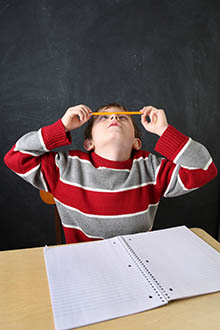
October is National ADHD (Attention Deficit Hyperactivity Disorder) Awareness Month. ADHD is a persistent disorder marked by continual inattention, hyperactivity or impulsivity. Parents, teachers and pediatricians usually notice ADHD symptoms appearing in children around ages 3-6 years old. The average age of ADHD diagnosis is 7 years old. However, some kids can be diagnosed later in years or some even into adulthood.
Many ADHD symptoms can be typical childhood behaviors, so it can be difficult to distinguish what is ADHD-related and what is not. Common symptoms of ADHD include:
Just because your child may be forgetful or talkative does not mean he or she has ADHD. You, your child, your child’s school counselor and other caregivers should be involved in assessing your child’s behavior. Take note of how long ago these symptoms started and how they affect your child’s life. Doctors diagnose children with ADHD only after a child has shown at least six specific symptoms of inattention or hyperactivity on a regular basis for more than six months in at least two settings. The physician will also discuss family history and consider all possible conditions.
Boys are three times more likely than girls to be diagnosed with ADHD. Not all signs of ADHD are hyperactive and impulsive. Some kids, girls in particular, with the disorder are relatively calm. They often display less disruptive symptoms, like daydreaming or difficulty focusing on schoolwork, which is why their ADHD often goes undiagnosed or untreated.
According to the Centers for Disease Control and Prevention (CDC), more than six million American children, ages 4-17, have ADHD. Co-existing conditions include learning disabilities, anxiety, depression, bed-wetting problems, and sleep disorders. Although kids with ADHD face challenges, there are also positive traits associated with the disorder. Children with ADHD may be more creative, flexible, enthusiastic and driven.
Children with ADHD are likely to grow up to be adults with ADHD. There are treatments for ADHD that can help manage symptoms. These should be discussed with your child’s pediatrician. Some children are able to effectively treat their ADHD through education, support at home and school, proper nutrition and exercise. ADHD manifests differently in each child. If you have serious concerns about your child’s behavior, make an appointment with your pediatrician today.